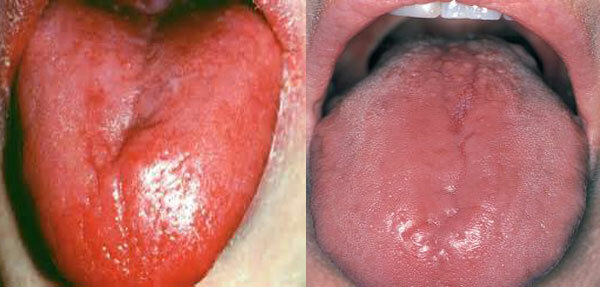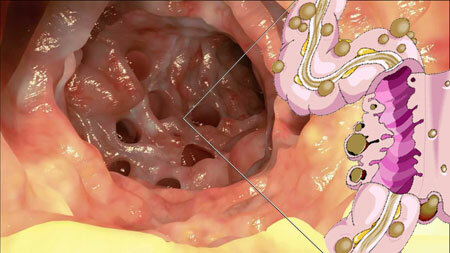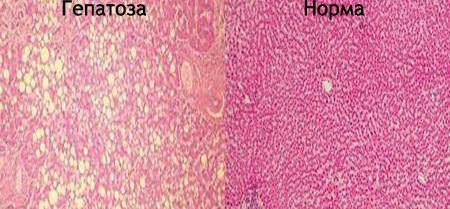Inflammatory changes in the language significantly complicate the patient's life. The appetite disappears, it becomes impossible to banal teeth cleaning, there are problems with speech.
The disease can develop independently or be a consequence of diseases of other internal organs. Consider what this problem is and why it appears.
Contents of
- 1 Glossitis - what is it?
- 2 Symptoms of glossitis by species
- 3 Glossitis in a child
- 4 Treatment of glossitis, preparations
- 5 Folk methods of treating glossitis
- 6 Prevention of glossitis
Glossitis - what is it?
Glossitis is an inflammatory process of the tongue, cracked under the influence of various aggressive external factors. The disease is accompanied by severe discomfort in the mouth and can occur in both acute and chronic form.
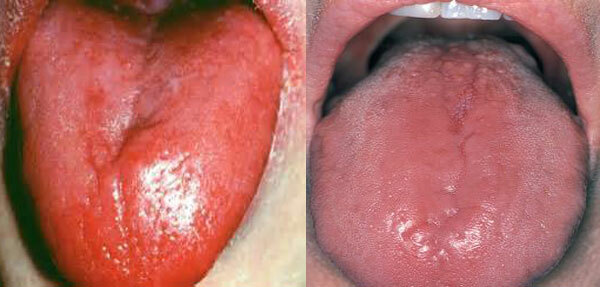
occurs equally often in both adults and children. The cause of the disease can be:
- Mechanical injuries and damage. Injury of the tongue with teeth, foreign objects, a false jaw or even a banal toothbrush can lead to the appearance of microdamages, which will become the basis of the inflammatory process.
- Allergic factors. Food allergens, filling material, hypersensitivity to mouthwashes and toothpastes can cause the allergic reaction of inflammation.
- Deficiency of individual vitamins and minerals in the body. So, with a lack of vitamin B12, Hunter's glossitis develops. Iron deficiency and megaloblastic anemia can cause inflammation of the tongue.
- Bacterial, viral and fungal agents. These microorganisms begin to show their pathogenic effect especially in conditions of reduced immunity.
- Some physical illnesses can cause inflammatory changes in the tongue. These include diabetes mellitus, digestive tract diseases, liver cirrhosis, HIV infection, systemic mycosis and others.
Thus, glossitis can cause more than twenty different causes, the most frequent of which are gastrointestinal diseases, allergies and the infectious process.
Symptoms of glossitis by species
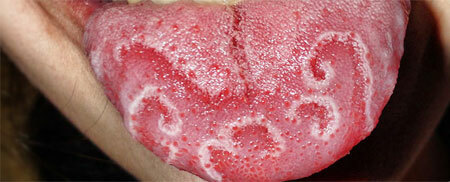
Desquamative glossitis Photo
There are several classifications of glossitis. It is divided into acute and chronic. Chronic inflammation of the tongue often occurs with constant contact with the allergen or the presence of diseases of the digestive system. An acute process usually causes trauma or infection.
Depending on the cause that caused the development of pathology, there are: traumatic, allergic, viral, bacterial, candidosis glossitis.
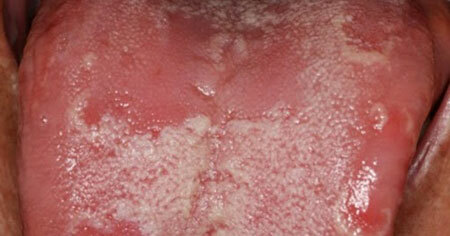
Taking into account the pathological changes, desquamative, folded, interstitial and other forms of inflammation are distinguished.
Important! Desquamative glossitis is a form of inflammation of the tongue, in which it is covered with small scales. The second name of this form is "geographical language".It occurs with permanent traumas of the tongue, prolonged stress or during hormonal disorders, for example, with menopausal women.
If the inflammatory process affects only the mucous membrane of the tongue, talk about catarrhal inflammation. When the inflammatory process spreads into the stratum of the lingual muscle, the catarrhal form can pass into the purulent form with the formation of an abscess or phlegmon of the tongue. This condition requires immediate surgical care.
Symptoms of glossitis depend on its cause. Most often the patient is concerned about the following complaints:
- Pain and difficulty in speaking, trying to eat.
- Puffiness of the lingual muscle.
- Burning and itching in the mouth.
- The tongue itself is red, inflamed, may be covered with pus or whitish films( with Ludwig's angina or pernicious anemia).With a deficiency of vitamin B12, the tongue becomes bright red, almost crimson, it glitters as if varnished.
- In mycotic lesions, the tongue is covered with fungal deposits. The same raids are located on the tonsils, gums and the posterior surface of the pharynx.
- Severe swelling can lead to suffocation and a feeling of lack of air.
In parallel, the patient is troubled by the symptoms of the underlying disease, which could cause glossitis: abdominal and liver pain, symptoms of anemia and intoxication of the body during an infectious process.
Glossitis in a child
Inflammation of the tongue in childhood is usually associated with trauma, food allergens or the action of corrosive substances. Young children tend to try foreign objects and liquids for taste, which often leads to burns and damage to the tender mucous membrane.
Chronic forms in children are less common and can be associated with a hereditary predisposition or malnutrition.
Symptoms and treatment of glossitis of the tongue in childhood are similar to those of an adult, except that the baby can not always tell about his complaints.
Such children often refuse to eat, start to talk badly because of discomfort in the mouth and severe pain syndrome.
Treatment of glossitis, preparations
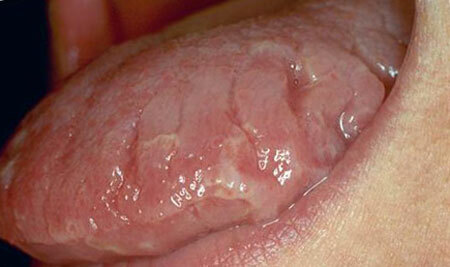
Treatment of glossitis of the tongue is performed by a dentist, but in the presence of concomitant diseases, a therapist, gastroenterologist, infectious diseases specialist and other specialists are connected to treatment.
Therapy of glossitis depends on the underlying cause of the development:
- When an allergic variant of inflammation is removed, contact with the allergen is eliminated and antihistamines are used.
- In case of traumatic injury, rinse the mouth with antiseptic and healing solutions.
- With syphilitic glossitis, specific therapy is performed.
- If the reason was a lack of vitamins and minerals, then first of all make up the deficit of these substances.
- In candidosis glossitis, the patient's immune status is checked and normalized and local antimycotic agents are used.
- Diseases of the gastrointestinal tract in combination with glossitis are treated with various groups of drugs( probiotics, sorbents, antibiotics for Helicobacter pylori, etc.).
Throughout the treatment, the patient is advised to adhere to a chemically and thermally sparing diet in order not to further injure the mucous membrane of the tongue.
In the development of abscesses or phlegmon, a surgical procedure is performed and the purulent focus is drained.
Folk methods of treating glossitis
Traditional medicine is effective in traumatic glossitis or during recovery from illness. Use rinses with decoctions of herbs-antiseptics( chamomile, string, calendula).
When glossitis caused by the pathology of the digestive system, apply herbal preparations and teas, which normalize the work of the digestive tract( ayr, marshmallow, plantain, etc.).
In the presence of ulcers or erosions, systemic allergies and other severe co-morbidities, folk treatment should be agreed with the treating doctor.
Prevention of glossitis
For prevention, do not recommend to climb into your mouth with foreign objects, monitor your diet and regularly brush your teeth and tongue.
To prevent the development of inflammation in this area you need to control your diet, lifestyle and avoid stress. In addition, an annual visit to the dentist and timely dental treatment will help to avoid this problem.
Glossitis is an inflammation of the tongue, which causes various causes and factors. The disease is accompanied by itching, burning and pain in the lingual muscle. As you can see, the symptoms and treatment of glossitis are related, without determining the type of disease it is impossible to prescribe adequate therapy and choose effective medications. The reason is the first principle in determining the treatment technique.
The prognosis for cure in most forms of glossitis is favorable.

